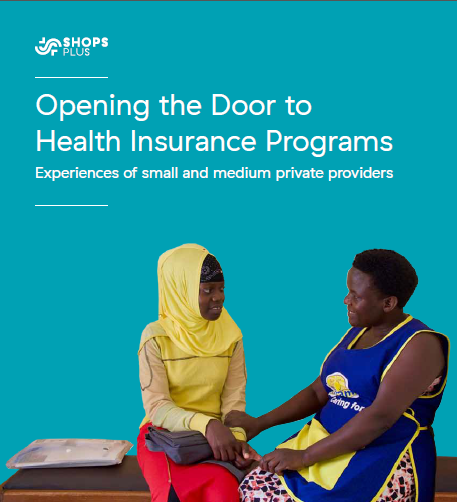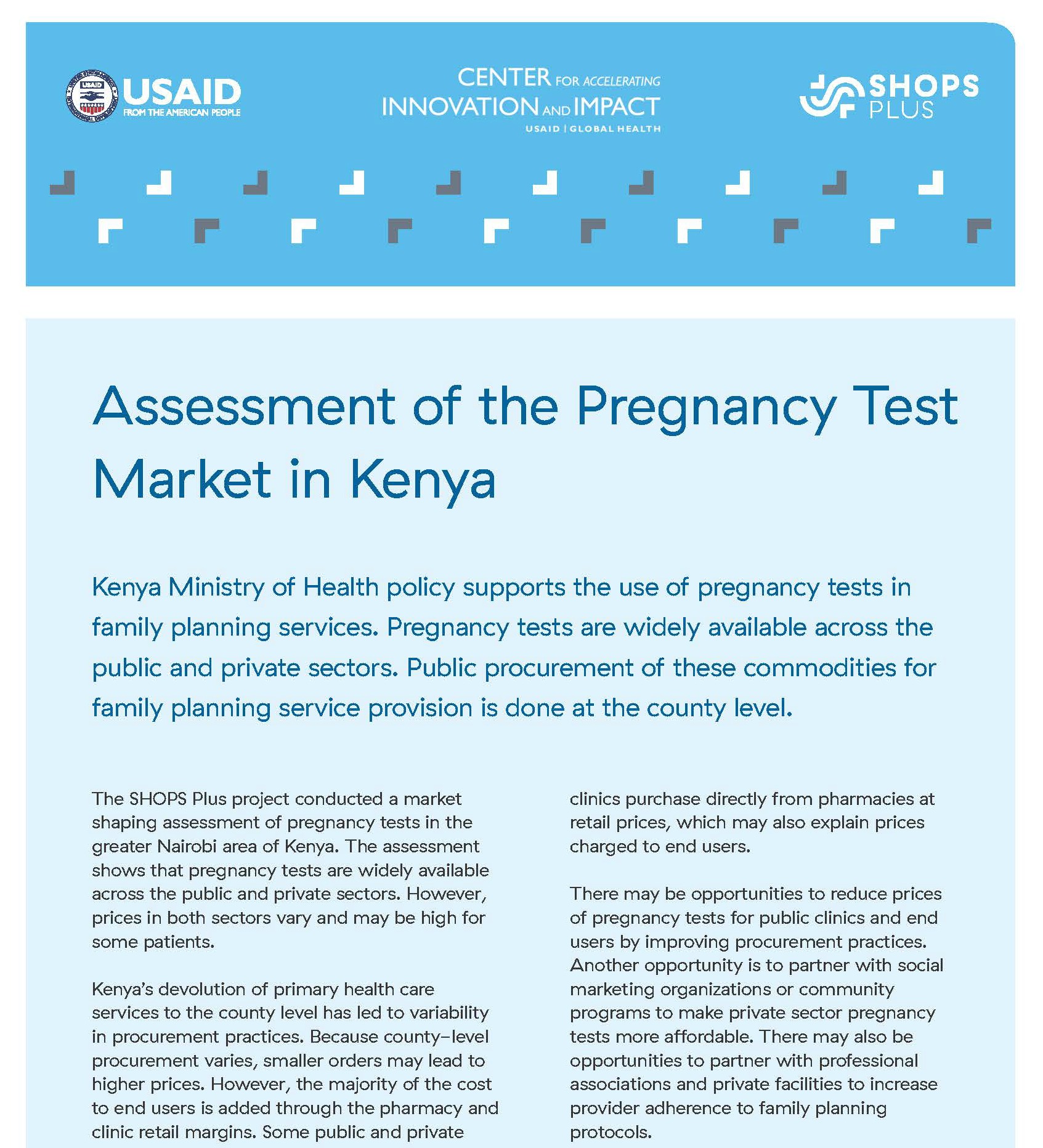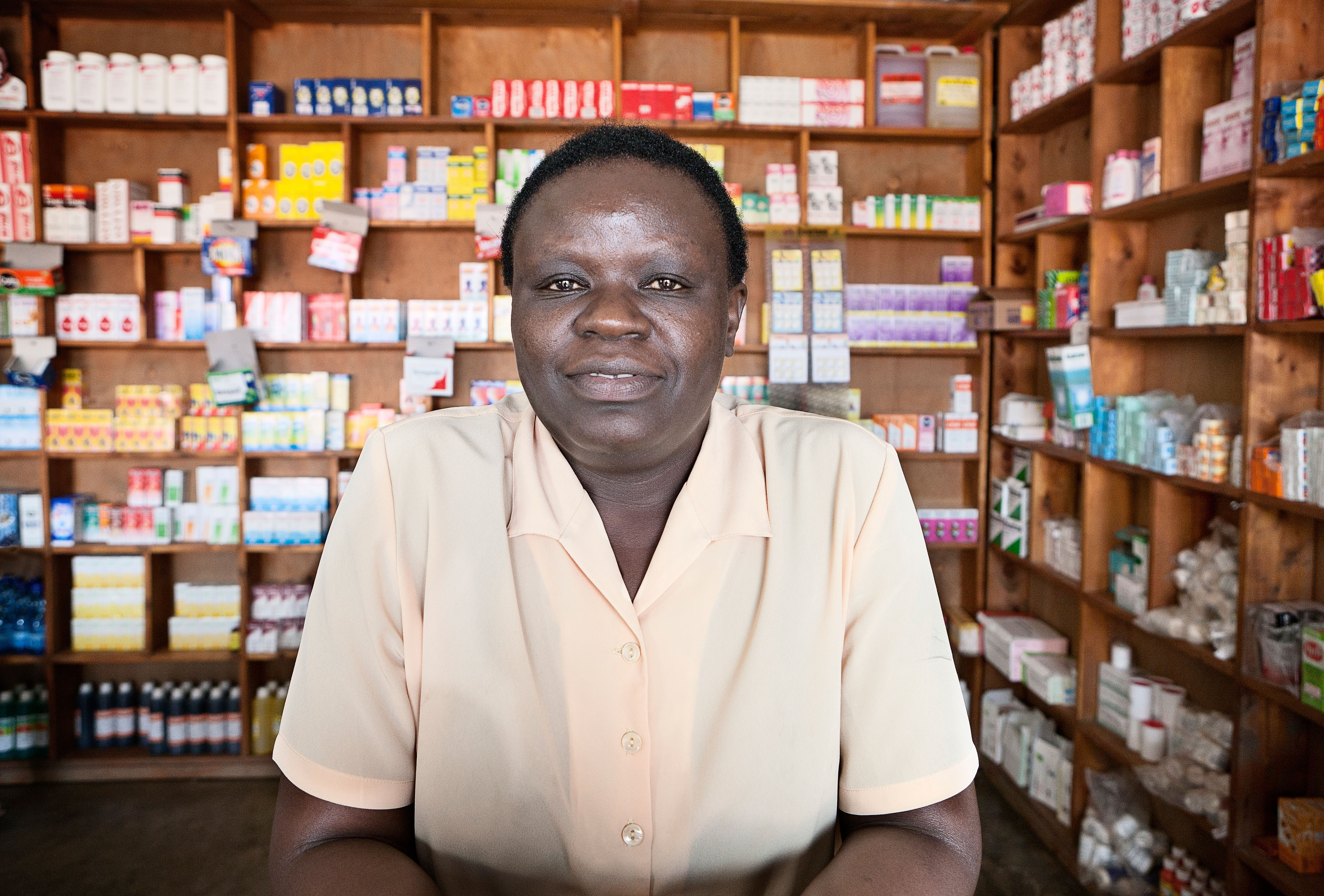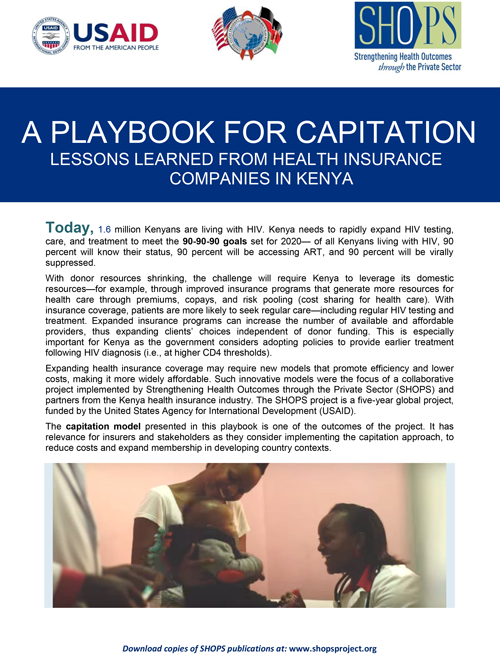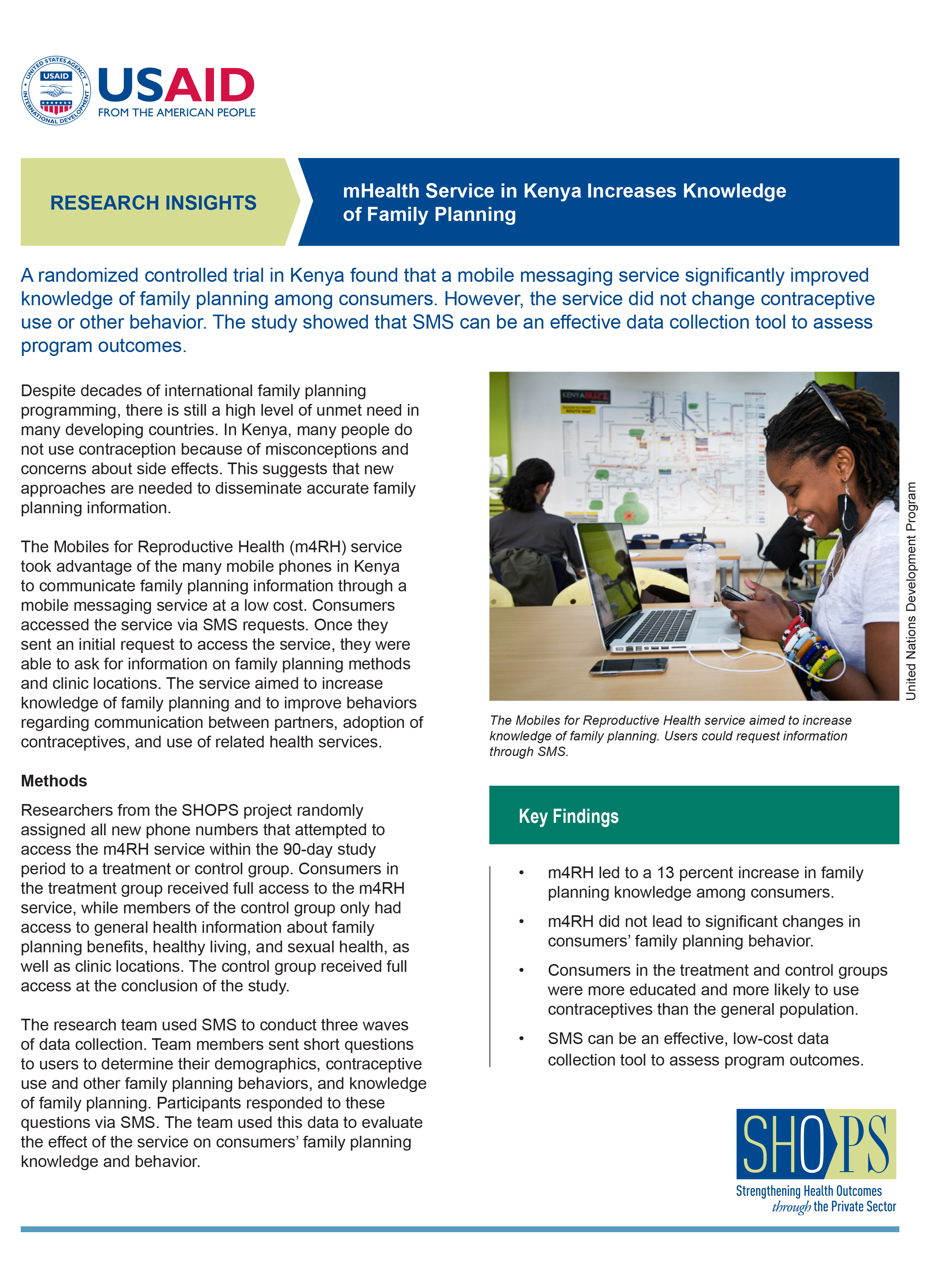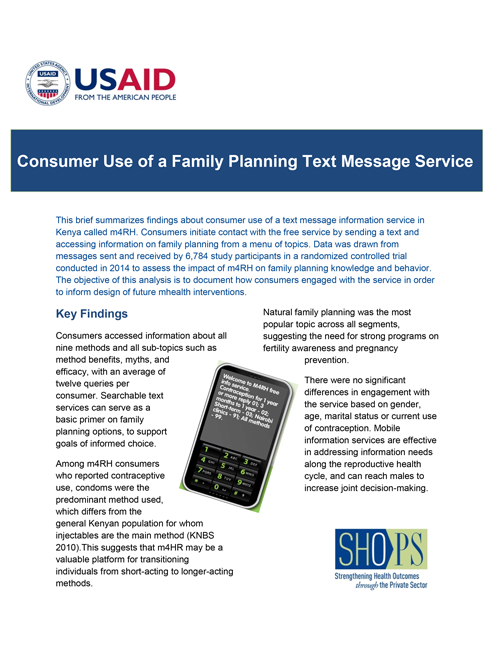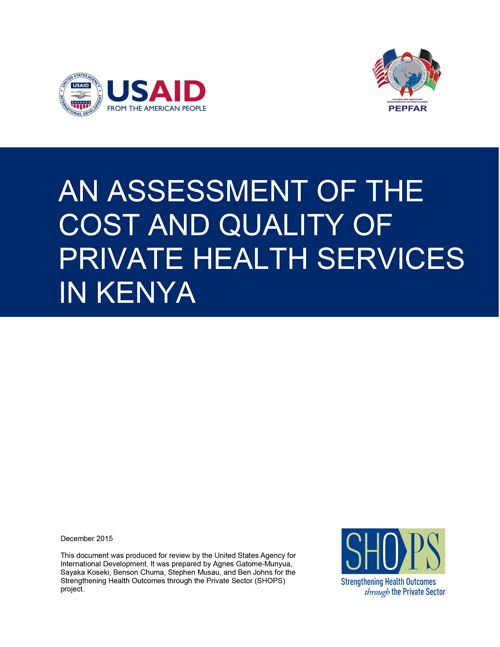
Resource Library
Opening the Door to Health Insurance Programs: Experiences of Small and Medium Private Providers
Small and medium private health care providers are valuable partners in scaling up health financing programs that support universal health coverage. However, it is often challenging for them to participate because they have fewer resources and the process can be arduous and costly. The requirements and processes for these providers to participate in health financing programs, and the ease (and pitfalls) of doing so have not been well documented. This brief presents the experiences of small and medium providers who participate in health financing programs, particularly government-sponsored programs. It cites examples from the Dominican Republic, Ghana, India, Kenya, the Philippines, and Tanzania.
Resource Type : Brief
Country : Ghana, India, Kenya, Philippines, Tanzania
Year : 2018-05-22T10:00:00
Language : English
Project : SHOPS Plus

Resource Library
Sources for Sick Child Care in Kenya (Presentation)
The public sector is the dominant source of care in Kenya. Understanding if and where sick children are taken for care is critical to improve case management interventions. This presentation provides a secondary analysis of the 2014 Kenya Demographic and Health Survey to examine where treatment or advice is sought for sick children who experienced at least one of three treatable illnesses: fever, acute respiratory infection, or diarrhea. These illnesses represent some of the leading causes of death in children under five years old.
Resource Type : Presentation
Country : Kenya
Year : 2018-08-06T12:00:00
Language : English
Project : SHOPS Plus

Resource Library
Sources for Sick Child Care in Kenya
The public sector is the dominant source of care in Kenya. Understanding if and where sick children are taken for care is critical to improve case management interventions. This brief presents a secondary analysis of the 2014 Kenya Demographic and Health Survey to examine where treatment or advice is sought for sick children who experienced at least one of three treatable illnesses: fever, acute respiratory infection, or diarrhea. These illnesses represent some of the leading causes of death in children under five years old.
Resource Type : Brief
Country : Kenya
Year : 2018-08-06T12:00:00
Language : English
Project : SHOPS Plus

Resource Library
A Randomized Controlled Trial of the Impact of a Family Planning mHealth Service on Knowledge and Use of Contraception
Objectives
mHealth, or the use of mobile phones for health, is a promising but largely untested method for increasing family planning knowledge in developing countries. This study estimates the effect of m4RH, an mHealth service in Kenya that provides family planning information via text message, on consumers' knowledge and use of contraception.
Study design
We randomly assigned new consumers of the m4RH service to receive either full access or limited access to m4RH. We collected data on outcomes by sending questions directly to consumers via text message.
Results
Response rates to the text message surveys ranged from 51.8% to 13.5%. Despite relatively low response rates, response rates were very similar across the full-access and limited-access groups. We find that full access to m4RH increased consumers' scores on a test of contraceptive knowledge by 14% (95% confidence interval: 9.9%–18.2%) compared to a control group with limited access to m4RH. m4RH did not increase consumers' use of contraception, likelihood of discussing family planning with their partners, or likelihood of visiting a clinic to discuss family planning.
Conclusion
Text messages may increase family planning knowledge but do not, by themselves, lead to behavior change.
Implications
Text messages can be an effective method of increasing family planning knowledge but may be insufficient on their own to cause behavior change.
This article was published in Contraception, Volume 95, No. 1, pages 90-97.
Resource Type :
Country : Kenya
Year : 2017-01-01T00:00:00
Language : English
Project : SHOPS Plus

Resource Library
Assessment of the Pregnancy Test Market in Kenya
The SHOPS Plus project conducted a market shaping assessment of pregnancy tests in the greater Nairobi area of Kenya. The assessment shows that pregnancy tests are widely available across the public and private sectors. However, prices in both sectors vary and may be high for some patients.
Resource Type : Brief
Country : Kenya
Year :
Language : English
Project : SHOPS Plus

Resource Library
Availability of HIV Rapid Diagnostic Tests Over the Counter
SHOPS conducted assessments of over-the-counter availability of HIV rapid diagnostic tests through private pharmacies in Kenya, Malawi, Tanzania, and Uganda. The objective was to assess the extent to which the tests were readily accessible to and used by consumers for self-testing, in lieu of facility-based HIV testing services. The assessment revealed several findings regarding HIV rapid diagnostic tests, including their regulatory oversight, availability, source, demand, and future role.
Resource Type : Report
Country : Kenya, Malawi, Tanzania, Uganda
Year : 2016-12-01T00:00:00
Language : English
Project : SHOPS

Resource Library
A Playbook for Capitation: Lessons Learned from Health Insurance Companies in Kenya
Today, 1.6 million Kenyans are living with HIV. Kenya needs to rapidly expand HIV testing, care, and treatment to meet the 90-90-90 goals set for 2020— of all Kenyans living with HIV, 90 percent will know their status, 90 percent will be accessing ART, and 90 percent will be virally suppressed.
With donor resources shrinking, the challenge will require Kenya to leverage its domestic resources—for example, through improved insurance programs that generate more resources for health care through premiums, copays, and risk pooling (cost sharing for health care). With insurance coverage, patients are more likely to seek regular care—including regular HIV testing and treatment. Expanded insurance programs can increase the number of available and affordable providers, thus expanding clients’ choices independent of donor funding. This is especially important for Kenya as the government considers adopting policies to provide earlier treatment following HIV diagnosis (i.e., at higher CD4 thresholds).
Expanding health insurance coverage may require new models that promote efficiency and lower costs, making it more widely affordable. Such innovative models were the focus of a collaborative project implemented by Strengthening Health Outcomes through the Private Sector (SHOPS) and partners from the Kenya health insurance industry. The SHOPS project is a five-year global project, funded by the United States Agency for International Development (USAID).
The capitation model presented in this playbook is one of the outcomes of the project. It has relevance for insurers and stakeholders as they consider implementing the capitation approach, to reduce costs and expand membership in developing country contexts.
Resource Type : Report
Country : Kenya
Year : 2016-08-09T10:00:00
Language : English
Project : SHOPS

Resource Library
mHealth Service in Kenya Increases Knowledge of Family Planning
A randomized controlled trial in Kenya found that a mobile messaging service significantly improved knowledge of family planning among consumers. However, the service did not change contraceptive use or other behavior. The study showed that SMS can be an effective data collection tool to assess program outcomes.
Resource Type : Brief
Country : Kenya
Year : 2016-01-31T00:00:00
Language : English
Project : SHOPS

Resource Library
Consumer Use of a Family Planning Text Message Service
This brief summarizes findings about consumer use of a text message information service in Kenya called m4RH. Consumers initiate contact with the free service by sending a text and accessing information on family planning from a menu of topics. Researchers assessed the impact of m4RH on family planning knowledge and behavior by drawing data from the messages sent and received by 6,784 study participants in a randomized controlled trial. The objective of this analysis was to document how consumers engaged with the service to inform the design of future mhealth interventions.
Resource Type : Brief
Country : Kenya
Year : 2016-05-05T00:00:00
Language : English
Project : SHOPS

Resource Library
An Assessment of the Cost and Quality of Private Health Services in Kenya
The SHOPS project was tasked to obtain accurate and reliable cost and quality data about private sector provision of health care in Kenya. SHOPS partnered with the Deutsche Gesellschaft für Internationale Zusammenarbeit (GIZ) to conduct a national health care costing study, collecting data from 238 public and private health care facilities in 17 Kenyan counties. SHOPS used the collected data for this follow-on study — the first systematic study of health care cost and quality in Kenya. SHOPS analyzed the data using the Management Accounting System for Hospitals, an Excel-based health facility costing tool, to generate outpatient and inpatient costs across different levels and types of facilities. In addition, the study generated service-specific costs for voluntary counseling and testing, antiretroviral therapy, family planning, and maternity care services.
Resource Type : Report
Country : Kenya
Year : 2015-12-30T00:00:00
Language : English
Project : SHOPS
Pagination
- Previous page
- Page 4
- Next page


